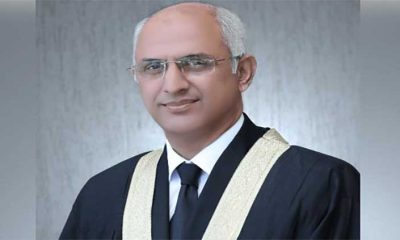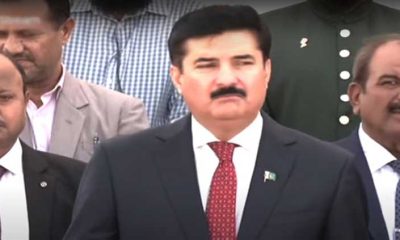Prime Minister Shehbaz Sharif said on Tuesday terrorism, in all its forms and manifestations, should be condemned in “clear and unambiguous terms”.
“There can be no justification for the killing of innocent people regardless of the cause or pretext,” he said while addressing the virtual summit of the Shanghai Cooperation Organisation (SCO) hosted by India.
The premier called for a joint action by the member states of the SCO to address the common challenges of economic recession, terrorism and climate change.
“The hydra-headed monster of terrorism and extremism, whether committed by individuals, societies or states, must be fought with full vigour and conviction,” he made it clear.
Sharif advised India against using terrorism for diplomatic point-scoring, saying terror activities remain a serious obstacle to peace in the region.
The prime minister said the “monster” of terrorism and extremism must be fought with vigour and determination by all SCO states. He pointed out that diplomatic point-scoring must be avoided by all countries and said all forms of terrorism, including state terrorism, must be condemned.
“There is no justification for killing people. Also, the religious minorities should not be marginalised in the garb of political agenda,” he said.
Sharif said the SCO countries must take concerted actions against terrorism, extremism and separatism both in their national capacities and also under the framework of SCO-RATS (Regional Anti-Terrorist Structure).
He was of the view that stability in Afghanistan was critical for achieving this “common objective”, saying the world was presently at a “standstill” with the war-torn country.
Terming peace and security a common concern, he said stability in Afghanistan was critical to achieving the common objective.
He highlighted the impending grave humanitarian crisis and economic meltdown in Afghanistan, which he said, needed urgent corrective measures by the interim Afghan government and the international community.
PM Sharif said the SCO leaders were meeting at a critical juncture as the world faced socio-economic challenges. He stressed that the regional organization could play the role of “beacon of peace, stability, and progress”.
Terming regional connectivity a defining feature of the modern economy, he emphasized focusing on investment in this area as a “vehicle of peace and prosperity”.
He mentioned that the China Pakistan Economic Corridor (CPEC), a flagship project of the Belt and Road Initiative, could become a game-changer of progress in view of Pakistan’s location connecting the region.
He announced that Pakistan was planning to host a regional connectivity conference in the last quarter of the current year.
On climate-induced disasters, the prime minister said the situation demanded global solidarity as it was the time to act “now and immediately”.
He mentioned that Pakistan, during the last year’s flash floods, faced the “horrors of climate change”, leading to 1,700 deaths and economic losses worth $30 billion.
Sharif said poverty alleviation must be a priority in the wake of economic recession.
On Islamophobia, he said peace and communal harmony were the need of the hour. He emphasized adhering to the resolutions of the UN Security Council to settle the issues amicably before it was too late.
The prime minister expressed Pakistan’s resolve to play a positive and constructive role in making SCO an effective regional organisation.
He thanked India for its stewardship of SCO during the past year and congratulated Kazakhstan for assuming the chair for the next year and congratulated the President of Iran on his country’s inclusion in the organization as a full member.
Earlier, Indian Prime Minister Narendra Modi said the SCO should join hands to fight terrorism and not hesitate to condemn countries that support terror.
He also urged leaders of the Eurasian political and security grouping to work for the welfare of Afghanistan and provide humanitarian aid to Kabul.
Afghan soil, Modi told the virtual summit of SCO leaders, should not be allowed to be used to destabilise its neighbourhood.
Invitation to Prime Minister Shehbaz Sharif to attend the meeting has been given by Indian Prime Minister in his capacity as the current Chair of the SCO.
The premier participated in the 23rd meeting of the SCO Council of Heads of States through video-link. Russia and China were among the other countries who attended the meeting.
Ahead of the summit, the Foreign Office said PM Shehbaz’s participation “illustrates the high importance that Pakistan attaches to the SCO, as an important forum for regional security and prosperity, and enhanced engagement with the region”.
During the SCO meeting, the global leaders deliberated on important global and regional issues and chart the future direction of cooperation among SCO member states.
This year, the SCO Council of Heads of States will also welcome Iran as a new member of the organisation.
The prime minister’s participation in the meeting illustrates the high importance that Pakistan attaches to the SCO, as an important forum for regional security and prosperity, and enhanced engagement with the region.
Post Views: 130


 Sports3 months ago
Sports3 months ago
 Fashion2 months ago
Fashion2 months ago
 Sports3 months ago
Sports3 months ago
 pakistan3 months ago
pakistan3 months ago
 pakistan3 months ago
pakistan3 months ago
 World2 months ago
World2 months ago
 World2 months ago
World2 months ago
 Sports2 months ago
Sports2 months ago






















